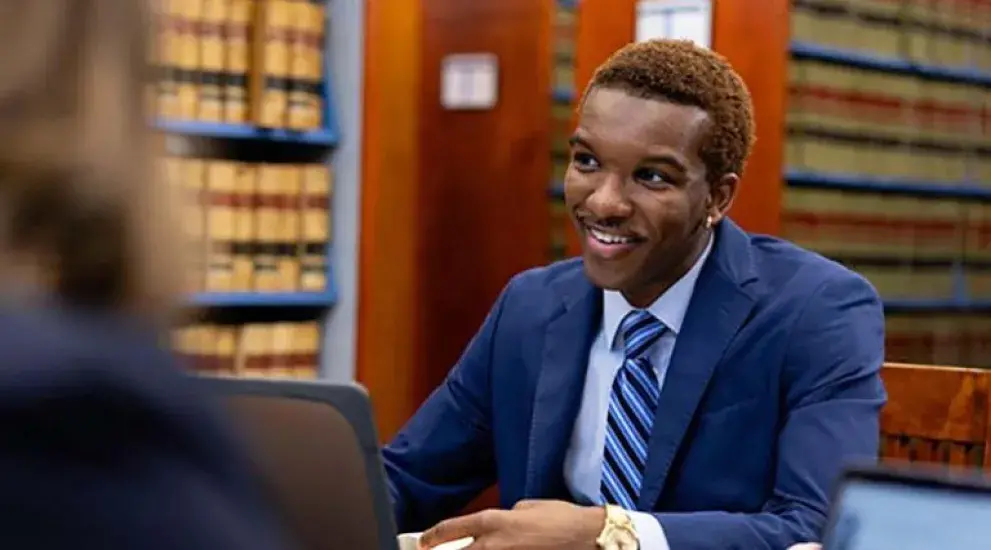
School of Law
With top academics and strong humanist principles, Creighton University produces legal professionals who build a more just world.
Where a Passion for Law—and Compassion for People—Unite for Good
The School of Law at Creighton University is dedicated to cultivating judicious, well-rounded legal minds. Our expert faculty will guide and mentor you through a powerful legal education that will help you find your distinct place in the world. We offer several programs to meet different goals, including an accelerated option, as well as externships and summer excursions.
Each of our programs is rooted in Jesuit, Catholic values to ensure graduates are not only superior legal professionals, but also compassionate leaders. If you’re looking to make a difference as you defend due process, Creighton University School of Law is the place for you.
Juris Doctor Program
Earn your juris doctor degree at Creighton University and learn to ethically and successfully practice law in the real world. We offer full-time, part-time and accelerated options, along with dual degrees, and our wide range of concentrations let you focus your studies. Choose from options like business law, family law, litigation, sports law and more.
Students who want to make a difference choose Creighton.
The School of Law offers a purposeful education that’s focused on academic excellence, social justice and personal growth. Everything we offer is designed to help you find your place in the world—leading you to discover what is uniquely yours to do. When you choose Creighton, you'll benefit from:
- Our professors: The School of Law is home to educators who are truly present. They’ve earned outstanding reputations and are dedicated to both counseling and challenging you. Beyond just office hours, our professors have an open-door policy, which means you can stop by to ask questions or just chat—anytime.
- Small classes: Here, individualized attention is a daily reality. We keep class sizes small, because we believe they ultimately produce better lawyers. Our student-faculty ratio is 9-to-1, which fosters an educational experience that’s personal. And most courses have fewer than 25 students—especially in the second and third years.
- Our mentoring program: At your orientation, you’ll meet second-year (2L) law students who will serve as mentors. They’ve taken the courses you’ll be taking and know the professors who will be teaching you. They’ll listen. They’ll provide insights. And between the support you’ll receive from our mentors and our Student Success resources, your first year will be as smooth as possible.
- Practical experiences: We believe that while your legal future starts in the classroom, it shouldn’t end there. That’s why we connect students with a range of practical experiences to give you a well-rounded education. These experiences may take place through our legal clinics, externships in Omaha, moot court and trial teams and international programs.

full-time students

student-faculty ratio

male-female student ratio

of 2023 grads were employed, in a full-time degree program or not seeking employment 10 months after graduation
To #BeABluejay means to have an administration that values you and your success, and does everything they can to support your specific goals.
Reneé Jackson
Class of 2025
Creighton Law Events
Your gift can improve the future.
Last year, Creighton students volunteered 1,040+ hours of free legal service to clients who needed counsel but were unable to pay. By giving to the Creighton University School of Law, you can directly support incredible programs like this, as well as essential funding for student scholarships that sustain our future excellence.
Latest Law News
Contact Us
Creighton University
School of Law
402.280.2872
lawadmissions@creighton.edu
Accreditation, Bylaws, Disclosures, Policies and Reports
School of Law Bylaws
We operate in accordance with the Creighton University School of Law’s faculty bylaws and American Bar Association (ABA) accreditation standards.
Accreditation Information
Creighton University School of Law is approved by the Council of the Section of Legal Education and Admissions to the Bar of the American Bar Association, 321 North Clark Street, Chicago, IL 60654, 312.988.6738.
According to the ABA, “Law schools that are ABA-approved provide a legal education that meets a minimum set of standards promulgated by the Council and Accreditation Committee of the Section of Legal Education and Admissions to the Bar. Every U.S. jurisdiction has determined that graduates of ABA-approved law schools are eligible to sit for the bar exam in their respective jurisdiction.”












